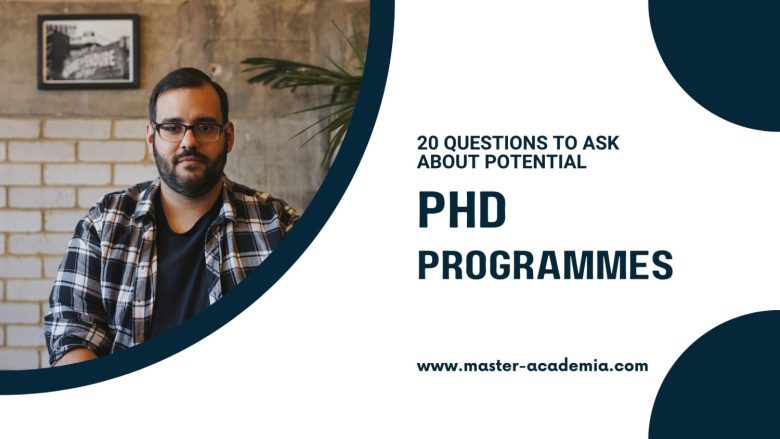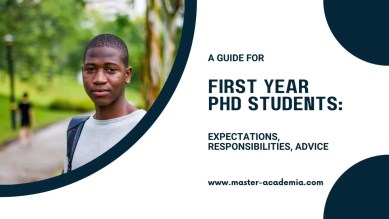
There usually comes a time in a PhD application process when the candidate can ask the admission committee questions about the programme. If you made it to this stage, you may be wondering: What questions should I ask about the PhD programme?
Disclaimer: This post may contain affiliate links, which means I may earn a small commission if you make a purchase using the links below at no additional cost to you. I only recommend products or services that I truly believe can benefit my audience. As always, my opinions are my own.
Contents
- Questions to ask about a PhD programme’s setup
- Questions to ask about a PhD programme’s environment
- What facilities and equipment are available to PhD students in this programme?
- How are PhD students of this programme integrated into the wider academic community?
- Do PhD students in this programme interact with senior scientists beyond their research group?
- How common is it for PhD students in this programme to co-author academic articles with supervisors and colleagues?
- Questions to ask about a PhD programme’s support mechanisms
- What support is offered to PhD students in the programme?
- Does the programme offer any financial support?
- Does the PhD programme provide grant writing support to PhD students?
- Does the programme encourage and support PhD students to work as teaching assistants?
- What happens if there is a problem with a PhD supervisor?
- Questions to ask about a PhD programme’s career training and prospects
- What are common career trajectories of PhD students who complete this programme?
- What does the programme do to prepare PhD students for the job market?
- Does the emphasis lie on training PhD students for academic careers?
- Does the PhD programme foster industry connections, collaborations with external partners and public outreach activities?
- Does the programme organise networking events or career fairs for PhD students?
Questions to ask about a PhD programme’s setup
What makes this PhD programme unique?
A PhD interview is not just an opportunity for you to convince your interviewers that you are a good match for their programme. Your interviewers should also leave a good impression on you! This relatively open question allows them to convince you to choose their programme over any other offers that you may have. It is a good way for you to see what arguments they have to offer.
What are the requirements in terms of coursework?
The amount of coursework can differ from PhD programme to PhD programme. Therefore, it is good to ask about specific requirements in terms of courses to follow, credits to earn, etcetera.
How does this programme structure the thesis writing process?
Similar to coursework, the thesis writing process can also differ from PhD programme to programme. Is the process divided into fixed stages (such as data collection, data analysis, and writing up)? Or is the process flexible? How is the thesis supervision organised? It is good to have answers to these types of questions in advance.
How long does it take on average for PhD students to complete the degree?
Most universities indicate the length of their PhD programmes. However, there can be a difference between the supposed length and the actual one. Potentially, a PhD programme takes 4 years on paper but most PhD students take 6 years to complete it. This information is useful to consider before committing to a programme.
How much flexibility do PhD students have to create their unique programmes?
You may have specific requirements for your PhD. Unique interest. And you should be aware that unexpected things can happen. For instance: care leave, illness or simply failed experiments can delay the completion of a PhD programme. Therefore, it is good to test the water and ask about the stance of the PhD programme when it comes to being flexible.
You may also like: 9 smart questions to ask a professor about graduate school
Questions to ask about a PhD programme’s environment
What facilities and equipment are available to PhD students in this programme?
You want to know what the PhD programme offers to PhD students, for example in terms of office space, lab equipment, laptops, etcetera. Think about the type of facilities and equipment that you would need for your specific PhD research.
How are PhD students of this programme integrated into the wider academic community?
There can be a huge difference in terms of how PhD students are treated in different universities. In some, they are considered regular students who have limited contact with senior scientists besides their supervisor/s. In others, they are treated as colleagues and/or staff members who are included in department meetings, research exchanges or joint lunches. Try to get a feeling for the situation in the specific PhD programme that you are considering.
Do PhD students in this programme interact with senior scientists beyond their research group?
As a follow-up to the previous question, you should enquire about the contact that PhD students of a specific programme have with scholars outside of their supervisor/s or small research unit. Being exposed to different perspectives, people and insights can hugely benefit PhD students’ work. Therefore it is good to know whether PhD students in a programme tend to work in isolated silos.
How common is it for PhD students in this programme to co-author academic articles with supervisors and colleagues?
Co-authoring (when done right!) is hugely beneficial to PhD students. It enables them to learn the art of writing scientific papers, and how to collaborate effectively. Furthermore, having publications can boost their career. In some universities, it is very common for PhD students to be included as co-authors in joint research papers. In others, it is not.

Questions to ask about a PhD programme’s support mechanisms
What support is offered to PhD students in the programme?
It is smart to start with a relatively broad question, to see what support mechanisms are offered in a PhD programme. This can be, for instance, a PhD council, a study advisor, or a mental health counsellor.
Does the programme offer any financial support?
Some departments have funds, for instance, to support fieldwork. Some also offer budgets to PhD students, so that they can participate in (international) conferences. You can even think of travel reimbursements if you have a longer commute. It is good to know about possibilities for financial support in advance.
Does the PhD programme provide grant writing support to PhD students?
PhD students without full-time funding often rely on grants and bursaries. Additionally, gaining experience in grant writing during a PhD can be advantageous in an academic career, regardless of one’s funding situation. However, grant writing is time-consuming and often requires approval and administrative support from the university. Is this support provided?
Does the programme encourage and support PhD students to work as teaching assistants?
Working as a teaching assistant during a PhD has financial benefits, and also improves PhD students’ chances of securing work as a lecturer once they graduate. Try to find out whether the PhD programme helps students to find these positions, and whether they support them (for instance by being flexible with the coursework schedule, etcetera).
What happens if there is a problem with a PhD supervisor?
A PhD supervisor plays a major role in the success of a PhD student. Unfortunately, not all PhD supervisors are good ones. Without being overly pessimistic, it can be a good idea to ask what would hypothetically happen if there is a problem with a PhD supervisor in the programme.
Questions to ask about a PhD programme’s career training and prospects
What are common career trajectories of PhD students who complete this programme?
Try to get a sense of what PhD students of a programme do once they graduate. This question also helps you to assess what type of career trajectories are highlighted in the programme. Based on this information, you can draw some conclusions about the programme’s outlook on post-PhD careers.
What does the programme do to prepare PhD students for the job market?
Some universities don’t do anything to prepare PhD students for the job market. Be it the academic or the non-academic one. Others may offer special training sessions, application support and other job-market-related activities. Even though you are only exploring options for PhD programmes, it can be smart to think ahead.
Does the emphasis lie on training PhD students for academic careers?
Many PhD students start their degree programmes with the ambition to pursue academic careers and ultimately become professors. The reality, however, looks very different: only a very small percentage ultimately pursues an academic career. New insights about the possibilities to work in a non-academic setting and a highly competitive labour market play a role in this trend. Finding out whether a PhD programme is aware and adjusts their training to this reality can be informative.
Does the PhD programme foster industry connections, collaborations with external partners and public outreach activities?
Being exposed to job opportunities outside of academia, and conducting practice-oriented research go hand in hand with the relationships that are fostered with industry, community or any other external partners. These connections are also increasingly valued by grant and promotion committees.
Does the programme organise networking events or career fairs for PhD students?
A PhD programme is not solely responsible for your career after graduation. Yet, it can be advantageous if a PhD programme actively organises events or fairs that help PhD students to network, and to forge good relationship with external parties.



